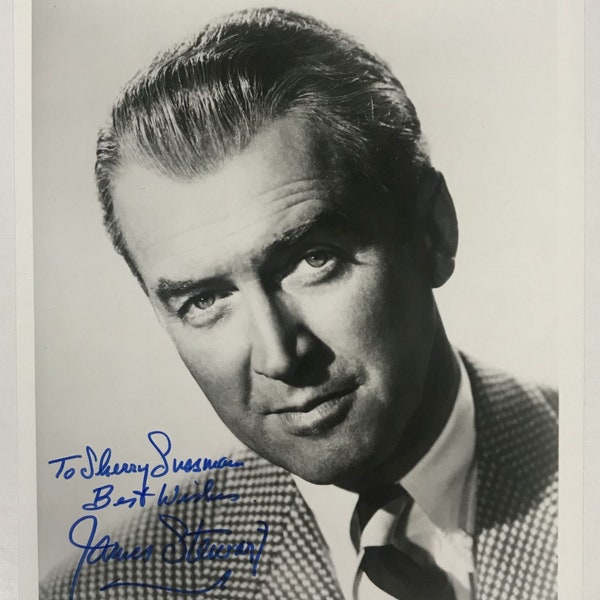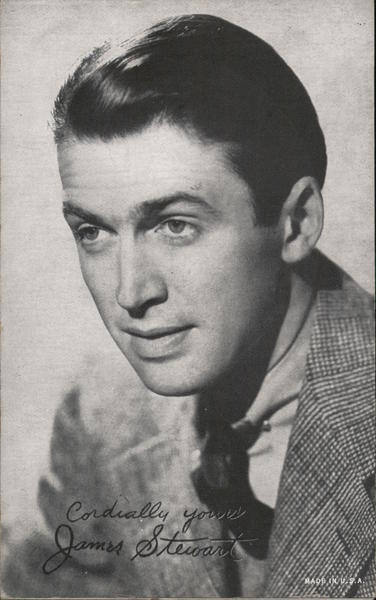There's something quite special about a person who, through their work, makes you feel like they could be someone you know, a good neighbor or a trusted companion. That's precisely the feeling many people got from James Stewart, a true icon of the silver screen. His presence on film sets a tone of genuine connection, a warmth that just seems to come through the picture. He had a way of being himself, a real person, which drew folks in, and that, you know, is a rare gift for anyone in front of the camera.
This actor, with his tall, somewhat gangly frame, a shy smile, and that particular way of speaking, a slow, drawn-out sound, seemed to embody the spirit of an ordinary person, someone you might meet on the street. It was this natural, unpretentious quality that made him so beloved, really. He just felt so familiar, like a person you'd known for a long while, and that kind of comfort is what makes a performer truly memorable for generations of movie watchers, as a matter of fact.
From the moment he first stepped onto the stage in New York City, and then for many, many years performing in front of movie cameras, James Stewart built a lasting reputation. His work on film became a significant part of cinema's history, full of timeless tales that still resonate with audiences today. You could say his contributions to storytelling through moving pictures left a truly big mark, and that, in some respects, is why we still talk about him.
Table of Contents
- The Life and Times of James Stewart
- What Made James Stewart So Relatable?
- How Did James Stewart Become a Hollywood Favorite?
- What Kinds of Characters Did James Stewart Bring to Life?
- Why Do We Still Watch James Stewart's Films Today?
The Life and Times of James Stewart
James Maitland Stewart, a person whose name became synonymous with a particular kind of American character on screen, began his life on May 20, 1908. He was born in a place called Indiana, which is a town in Pennsylvania. His parents were Elizabeth Ruth Johnson and Alexander Maitland Stewart, and his father, you know, ran a store. This upbringing in a fairly ordinary setting might have helped shape the sort of person he became, both off screen and on it, allowing him to connect with people in a very straightforward way.
From these beginnings, he went on to have a career that spanned a good many years, making him a household name. He was a person who made a mark in the world of acting, appearing in numerous motion pictures that are now thought of as important works of art. His ability to portray individuals who seemed honest, perhaps a bit innocent, full of good ideas, and possessing a strong sense of what's right, truly won over the hearts of those who watched him. It was almost as if he brought a piece of himself to every character, making them feel real and approachable, so to speak.
Personal Details and Bio Data of James Stewart
| Full Name | James Maitland Stewart |
| Born | May 20, 1908 |
| Birthplace | Indiana, Pennsylvania |
| Parents | Elizabeth Ruth (Johnson) and Alexander Maitland Stewart |
| Known For | Distinctive voice, everyman screen persona, portrayals of decent characters |
| Career Span | Over five decades in film |
| Recognitions | Nominated for five Academy Awards |
What Made James Stewart So Relatable?
People often speak about how James Stewart just felt like someone they already knew, a person they could easily chat with over a fence. This feeling of familiarity wasn't just a coincidence; it was a part of his very being that came across in his performances. Perhaps it was his tall, rather thin build, or that gentle, somewhat shy smile he often had. These physical traits, combined with his way of speaking, created an image that was anything but grand or distant, making him, you know, very much one of us.
His acting style, too, was a big part of this connection. He didn't seem to put on airs or try to be someone he wasn't. Instead, he presented characters who felt genuine, individuals facing everyday struggles or trying to do the right thing in a world that wasn't always simple. This natural way of being, this ability to make the extraordinary seem ordinary and the ordinary feel important, truly resonated with audiences, which is that kind of magic only some performers possess.
The Distinctive Voice of James Stewart
One of the most recognizable things about James Stewart was, without a doubt, his voice. It had a unique quality, a kind of slow, drawn-out sound that was instantly identifiable. This particular way of speaking added a layer of personality to every role he took on, making his characters even more memorable. It wasn't a booming voice or one that commanded attention through sheer volume; rather, it was a voice that felt thoughtful, sometimes hesitant, but always sincere, as a matter of fact.
That voice helped shape his image as the "everyman," the regular person caught up in unusual events. It gave his portrayals a sense of authenticity, making audiences believe in the individuals he brought to life on the screen. Whether he was delivering a serious speech or a simple line of dialogue, the sound of James Stewart's voice left a lasting impression, truly helping to cement his place in the hearts of many moviegoers, so to speak.
How Did James Stewart Become a Hollywood Favorite?
The path to becoming a beloved figure in Hollywood is often a winding one, and for James Stewart, it began far from the bright lights of the big screen. His early days in performance were on the stage, where he honed his craft and developed the skills that would later make him a standout in motion pictures. It was there, in the world of live theater, that he first caught the attention of those who saw his potential, almost a sign of what was to come.
His move from the stage to the movies marked the start of a truly remarkable journey. He didn't just appear in films; he made them his own, leaving an impression that few others could match. His appeal grew steadily, not through flashy displays, but through consistent, heartfelt performances that spoke to people directly. He became a favorite because he felt real, a quality that audiences, then and now, really appreciate in their movie stars.
From Broadway to the Big Screen - James Stewart's Start
Before he was lighting up movie screens around the globe, James Stewart was building his skills on the stages of Broadway. This early experience in live theater was crucial for his growth as a performer. It was where he learned the ins and outs of connecting with an audience in real time, where every gesture and spoken word had to count. This foundation in stage acting gave him a depth and sincerity that would later define his film work, you know, giving him a solid grounding.
His discovery on Broadway was the first step towards a long and very successful career in Hollywood. The transition from the immediacy of live performance to the more controlled environment of a film set didn't diminish his natural talent. Instead, it allowed his unique qualities – his gentle demeanor, his particular speaking style, and his ability to portray honest, good-hearted people – to shine even brighter for a much wider audience. This shift, basically, opened up a whole new world for him and for those who would come to admire his work.
What Kinds of Characters Did James Stewart Bring to Life?
When you think about the characters James Stewart played, a certain type of person often comes to mind. He had a special way of portraying individuals who were, at their core, decent. These were often people who might seem a little innocent or perhaps had a very clear idea of what was right and wrong. They were, in a way, the everyday heroes, folks who, despite their own doubts or challenges, generally tried to do good in the world, and that, is that.
He was particularly good at showing the journey of these characters, from moments of uncertainty to acts of quiet bravery. Whether they were facing a big challenge or simply trying to make sense of a confusing situation, his portrayals always felt genuine. He brought a sense of human vulnerability and strength to these roles, making them feel believable and truly touching for anyone watching. This ability to bring out the simple goodness in people was a hallmark of his acting, you know, a true gift.
The Enduring Appeal of James Stewart's Roles
The roles James Stewart chose, and the way he played them, created a lasting impression that continues to draw people in. His characters often embodied a certain kind of hopeful spirit, a belief in fairness and the power of the individual to make a difference. These were not always perfect people; sometimes they were a bit awkward or unsure, but their intentions were usually pure, which, you know, made them very appealing.
This consistent portrayal of honest, well-meaning individuals is a big part of why his films remain so popular. People connect with the struggles and triumphs of these characters because they see a bit of themselves, or perhaps the best parts of themselves, reflected on the screen. The quiet strength and integrity that James Stewart brought to his performances mean that his work still feels relevant and heartwarming, even after many years have passed, basically.
Why Do We Still Watch James Stewart's Films Today?
It's interesting to consider why, after all this time, films featuring James Stewart continue to capture the interest of new viewers and old fans alike. There's a certain quality to his movies that just seems to hold up, a kind of timeless storytelling that doesn't fade with the changing years. Perhaps it's the simple, yet profound, tales they tell, or the way they often speak to universal human experiences, like love, loss, and finding one's place in the world, that, is that.
His performances, too, are a major reason for this continued appreciation. He had a way of being so genuine on screen that his characters feel like real people you could meet, people whose stories you genuinely care about. This authenticity, combined with the often uplifting messages of his pictures, means that watching a James Stewart film can still feel like a comforting and thought-provoking experience. It's almost like visiting an old friend, a reliable source of good stories, and that, you know, is a powerful thing.
The enduring appeal of his work also comes from the straightforward nature of the narratives. These films often present clear moral choices or show the strength of ordinary people when faced with difficult situations. They don't rely on flashy tricks or complicated plots; instead, they focus on the heart of the story and the people within it. This focus on human connection and simple truths makes his movies feel as fresh and relevant now as they did when they were first released, in a way.
So, when you settle down to watch one of his old pictures, you're not just seeing a film from a different era. You're experiencing a piece of cinema that speaks to fundamental human qualities, brought to life by an actor who truly understood how to connect with an audience. His legacy is a collection of stories that continue to entertain and inspire, a testament to the lasting power of a truly good performer, basically.


